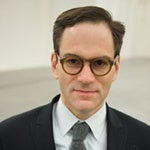Morris Series Lecture on Leadership and Innovation: Learning from China
Join us on the evening of Thursday, February 7 for a Morris Series lecture on Learning from China featuring a conversation surrounding the rise of globalization in the last decade and examining whether China has achieved more “success” than the United States. The program coincides with the exhibition Art and China after 1989: Theater of the World, a presentation of works by more than sixty artists and artists’ groups that anticipated, chronicled, and agitated for the sweeping social transformation that saw the rise of China as a global power in the new millennium. Featuring Julian Baird Gewirtz, Thomas Gold, and Javier C. Hernández in conversation with Philip Tinari with introductions by Alexandra Munroe.
The panel will span the first impacts of the 2008 economic crash through today. We will examine the ways in which the U.S. has responded to China’s extraordinary rise since 2008 and seek to clarify the many myths the U.S. has about China. We will explore the rise in populism, the fragmentation of information networks and who will dominate the internet and the flow of data. Set against the back drop of the exhibition, the artistic response from contemporary artists will also be addressed.
Presenter Biographies:
 Julian Baird Gewirtz is currently an Academy Scholar at Harvard’s Weatherhead Center for International Affairs. He completed his doctorate in history in 2018 at the University of Oxford, where he was a Rhodes Scholar. He is the author of Unlikely Partners: Chinese Reformers, Western Economists, and the Making of Global China, which The Economist called “a gripping read, highlighting what was little short of a revolution in China’s economic thought.” Professionally fluent in Mandarin Chinese, he has written on Asia for publications including the Wall Street Journal, the Washington Post, the Financial Times, Caixin, Foreign Affairs, and Foreign Policy.
Julian Baird Gewirtz is currently an Academy Scholar at Harvard’s Weatherhead Center for International Affairs. He completed his doctorate in history in 2018 at the University of Oxford, where he was a Rhodes Scholar. He is the author of Unlikely Partners: Chinese Reformers, Western Economists, and the Making of Global China, which The Economist called “a gripping read, highlighting what was little short of a revolution in China’s economic thought.” Professionally fluent in Mandarin Chinese, he has written on Asia for publications including the Wall Street Journal, the Washington Post, the Financial Times, Caixin, Foreign Affairs, and Foreign Policy.
 Thomas Gold is Professor of Sociology at the University of California, Berkeley. He was a member of the first group of American government-sponsored exchange students in China, studying at Fudan University from 1979-1980. Gold has published on such topics as youth, popular culture, social connections (guanxi) and micro enterprises, and has chaired Berkeley’s Center for Chinese Studies and was Executive Director of the Inter-University Program for Chinese Language Studies at Tsinghua University in Beijing, and is a member of the Advisory Board of the Asia Society of Northern California and has served on the boards of several other Asia-related non-profits. Gold received his B.A. in Chinese Studies from Oberlin College, and Masters in East Asian Studies and PhD in Sociology from Harvard.
Thomas Gold is Professor of Sociology at the University of California, Berkeley. He was a member of the first group of American government-sponsored exchange students in China, studying at Fudan University from 1979-1980. Gold has published on such topics as youth, popular culture, social connections (guanxi) and micro enterprises, and has chaired Berkeley’s Center for Chinese Studies and was Executive Director of the Inter-University Program for Chinese Language Studies at Tsinghua University in Beijing, and is a member of the Advisory Board of the Asia Society of Northern California and has served on the boards of several other Asia-related non-profits. Gold received his B.A. in Chinese Studies from Oberlin College, and Masters in East Asian Studies and PhD in Sociology from Harvard.
 Alexandra Munroe is an award-winning curator, Asia scholar and author focusing on art, culture and institutional global strategy. She is the Samsung Senior Curator of Asian Art and Senior Advisor, Global Arts at the Solomon R. Guggenheim Museum and Foundation where she has led the Guggenheim’s Asian Art Initiative since its founding in 2006. She has worked on over forty exhibitions and is recognized for establishing international critical acclaim for artists Cai Guo Qiang, Daido Moriyama, Yayoi Kusama, Lee Ufan, Mu Xin, and Yoko Ono, among others, and for bringing such historic avant-garde movements as Gutai, Mono-ha, Japanese otaku culture, and Korean Tanseakwa to international attention. Her project Japanese Art after 1945: Scream Against the Sky (1994) is recognized for initiating the field of postwar Japanese art history in North America. From 1998-2005, Munroe was Vice President of Japan Society, New York, and director of its museum where she presented innovative shows of pre-modern art. Munroe is lead curator of the Guggenheim’s exhibition, Art and China after 1989: Theater of the World, which The New York Times named as Top 10 exhibitions of 2017.
Alexandra Munroe is an award-winning curator, Asia scholar and author focusing on art, culture and institutional global strategy. She is the Samsung Senior Curator of Asian Art and Senior Advisor, Global Arts at the Solomon R. Guggenheim Museum and Foundation where she has led the Guggenheim’s Asian Art Initiative since its founding in 2006. She has worked on over forty exhibitions and is recognized for establishing international critical acclaim for artists Cai Guo Qiang, Daido Moriyama, Yayoi Kusama, Lee Ufan, Mu Xin, and Yoko Ono, among others, and for bringing such historic avant-garde movements as Gutai, Mono-ha, Japanese otaku culture, and Korean Tanseakwa to international attention. Her project Japanese Art after 1945: Scream Against the Sky (1994) is recognized for initiating the field of postwar Japanese art history in North America. From 1998-2005, Munroe was Vice President of Japan Society, New York, and director of its museum where she presented innovative shows of pre-modern art. Munroe is lead curator of the Guggenheim’s exhibition, Art and China after 1989: Theater of the World, which The New York Times named as Top 10 exhibitions of 2017.
 Philip Tinari is director of the Ullens Center for Contemporary Art in Beijing, where he oversees an exhibition program devoted to established figures and rising talents both Chinese and international, aimed at UCCA’s annual public of more than half a million visitors. Prior to joining UCCA he was editor-in-chief of LEAP, the international art magazine of contemporary China, which he founded and ran from 2009 to 2011. He has worked as China representative for Art Basel, contributing editor to Artforum, and lecturer in art criticism at the China Central Academy of Fine Arts. Tinari, who speaks fluent Mandarin, holds degrees from Duke and Harvard, and was a Fulbright fellow at Peking University.
Philip Tinari is director of the Ullens Center for Contemporary Art in Beijing, where he oversees an exhibition program devoted to established figures and rising talents both Chinese and international, aimed at UCCA’s annual public of more than half a million visitors. Prior to joining UCCA he was editor-in-chief of LEAP, the international art magazine of contemporary China, which he founded and ran from 2009 to 2011. He has worked as China representative for Art Basel, contributing editor to Artforum, and lecturer in art criticism at the China Central Academy of Fine Arts. Tinari, who speaks fluent Mandarin, holds degrees from Duke and Harvard, and was a Fulbright fellow at Peking University.
 Javier C. Hernández is an award-winning correspondent for The New York Times based in Beijing. Since moving to China in 2014, he has written about the Communist Party’s tightening grip on the news media and schools, the plight of pollution victims and migrant workers, and the rise of social causes like the #MeToo movement. He joined The Times in 2008 and has covered a variety of beats, including education, financial markets and New York City politics. He is a graduate of Harvard College.
Javier C. Hernández is an award-winning correspondent for The New York Times based in Beijing. Since moving to China in 2014, he has written about the Communist Party’s tightening grip on the news media and schools, the plight of pollution victims and migrant workers, and the rise of social causes like the #MeToo movement. He joined The Times in 2008 and has covered a variety of beats, including education, financial markets and New York City politics. He is a graduate of Harvard College.